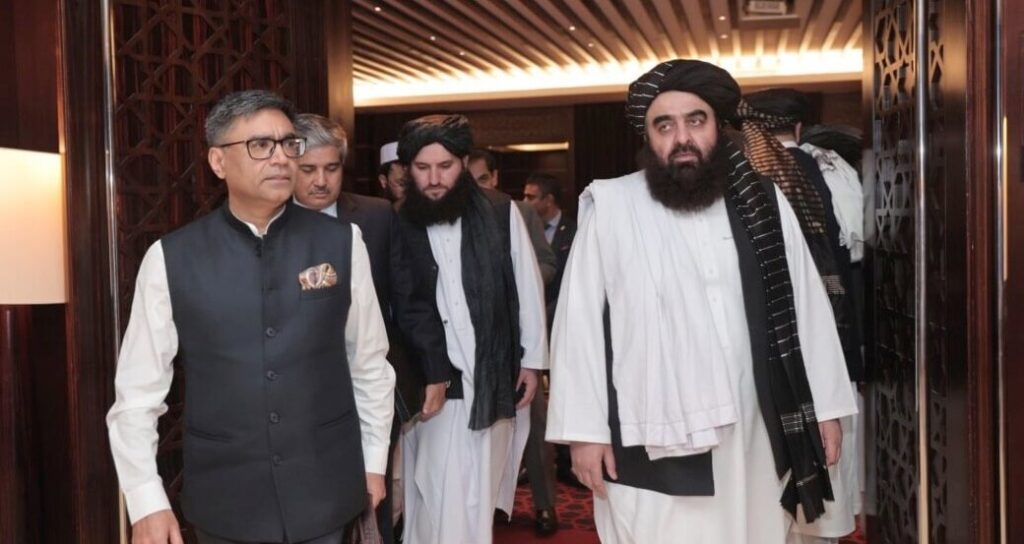World Geostrategic Insights interview with Shanthie Mariet D’Souza on the reasons for India’s growing involvement in Afghanistan, against the backdrop of China’s increasing influence in the country, and the prospects for Pakistan-Afghanistan relations.

Dr. Shanthie Mariet D’Souza is Founder and President at Mantraya Institute for Strategic Studies (MISS); Senior Research Fellow at University of Massachusetts Amherst, United States; Visiting Faculty Member at Naval War College, Goa, India; Research fellow at WeltTrends-Institut für internationale Politik, Potsdam, Germany; international advisor, Nordic Counter Terrorism Network, Helsinki, Finland; Adviser for Independent Conflict Research and Analysis, London. In a career spanning over two decades, she has conducted extensive field research in Afghanistan, India, Pakistan, China, Africa, and Australia.
Q1 – India’s Permanent Representative to the UN, Ambassador Parvathaneni Harish, recently told the UN Security Council that “special” people-to-people ties have been the “foundation” of India’s present-day engagement with Afghanistan. Last January, the high-level meeting held in Dubai between Vikram Misri, India’s foreign secretary, and Amir Khan Muttaqi, foreign minister of the Afghan Taliban, marked a significant step in diplomatic engagement of India towards the Taliban regime. Which are the “special” ties at the foundation of current growing engagement of India with Afghanistan? Why is India boosting diplomatic relations with Kabul?
A1: India has had a strong and long relationship with Afghanistan since the time of India’s independence. During the previous Republican era, India was Afghanistan’s largest regional donor and the fifth-largest global donor. It implemented numerous developmental, infrastructural, humanitarian, and capacity-building projects that benefited the Afghan people and fostered a strong bond and good will between India and Afghanistan.
The return of the Taliban to power in August 2021 following the precipitous US withdrawal from Afghanistan disrupted this relationship. However, within a few months, a technical team from the Indian government returned to Kabul to oversee the humanitarian assistance that had resumed, including medical supplies and wheat for the Afghan people. New Delhi believes that this special connection and good will with the Afghan population which it had established in the last two decades is advantageous for India in Afghanistan and needs to be sustained. Even the Taliban have requested India to resume its developmental activities and are even seeking more cooperation in the security sector.
India’s decision to enhance diplomatic relations with the Taliban aims to regain its influence in Afghanistan, which was lost in August 2021 with the Taliban takeover. This approach involves engaging with the Taliban without officially recognizing it. New Delhi seems to understand that, while Western countries have withdrawn and left the Afghan people to manage their own issues, India’s security, economic and strategic interests can only be met by increasing its presence in Kabul. Many regional countries have resumed their relations and are actively engaging with the Taliban. Therefore, it would be unwise for India to mimic the Western approach of complete isolation, especially when it has significant stakes in Afghanistan and its neighbourhood.
Q2 – China has substantially increased its economic engagement with Taliban-ruled Afghanistan, which is poised to become a new node in the Belt and Road Initiative. The expansion of Chinese investment in Afghanistan could strengthen China’s monopoly on many rare earth materials and infrastructure networks in Central Asia, considerably increasing its influence in the region. Can India’s efforts to stabilize and increase its relations with the current Taliban leadership also be seen as a move to counter China and assert its own influence in Central Asia?
A2: As China’s influence increases in Afghanistan particularly on the BRI, mineral and economic extraction, India’s decision to improve ties with the Taliban could be seen as a counter to China’s growing profile in that country. Afghanistan provides a range of opportunities for a large number of nations. Moreover, compared to China, India enjoys the advantage of its strong ties with the people of Afghanistan and a long historical and civilizational connection.
India certainly wants to capitalize on Afghanistan as a land bridge to improve its economic connection with Central Asia. India’s investment in the Iranian port of Chabahar is directed at that purpose. Prevailing insecurity did not allow that to happen during the Republic. Stability under the Taliban and their interest in the project may facilitate that objective. However, that is still a long-term objective and is unlikely to fructify as long as the Taliban are unable to transform themselves into an effective governing entity.
Q3 – Following their seizure of power in the summer of 2021, Pakistan thought it could leverage the Taliban regime to advance its regional interests, probably also in an anti-Indian capacity, not least taking into account the Taliban’s support for the separatist cause in Kashmir. Such calculations have proved inaccurate, as relations between the two countries have been deteriorating. Islamabad has accused Kabul of not doing enough to eradicate the TTP (Tehreek-e-Taliban Pakistan) despite the threat it poses to Pakistani state security through its actions from Afghan territory. And furthermore, the very demarcation of the borders between the two countries is still disputed. In your opinion, what are the prospects for Pakistan-Afghanistan relations, and for South Asian geopolitical balances?
A3: In international relations, there are no permanent friends or enemies; national interest dictates a nation’s decisions about its relationships with other countries. This dynamic is evident in the evolving relations between the Taliban and Pakistan since August 2021. The Taliban have become less dependent on Islamabad for their survival and are asserting their independent position on various issues, particularly with regard to the Durand Line and the TTP. To gain acceptance among the Afghan people, they must prioritize national issues such as borders, refugees, and trade.
Pakistan mistakenly believed it could turn the Taliban into a compliant regime having nurtured them for more than four decades, but this has proven to be a miscalculation and is facing a ‘strategic blowback”. As a result, there are speculations about shifts in the regional power balance, with India’s influence in Afghanistan increasing while Pakistan’s is waning. This shift indeed appears to be in New Delhi’s interest, as Pakistan has historically contributed to instability in both India and Afghanistan.
Although both nations—Afghanistan and Pakistan—have their differences, it is still possible for them to enhance their relationship and collaborate in areas such as trade. Many countries manage their bilateral relations based on this principle of economic necessity. Additionally, the Taliban is not a monolithic group; there may be factions within the organization that seek to improve relations with Pakistan. Even China, which shares warm relations with both, can play a role in managing the differences. However, as more countries increase their engagement with Afghanistan, the country could once again become a theatre of great power and regional competition leading to further instability in the conflict ridden country.
Dr. Shanthie Mariet D’Souza – Founder and President at Mantraya Institute for Strategic Studies (MISS).
Image Credit: MEAIndia (Indian Foreign Secretary Vikram Misri meeting with acting Foreign Minister of Afghanistan Mawlawi Amir Khan Muttaqi, in Dubai, January 2025).







